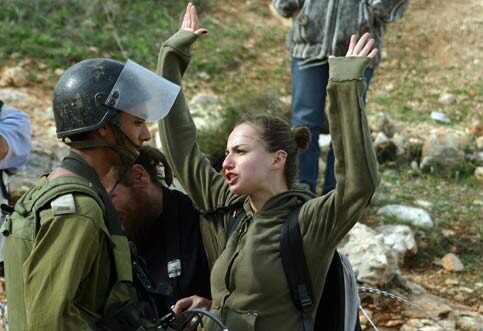Badil 29 November 2006

An international peace activist argues with an Israeli soldier during a demonstration against the controversial separation wall in the West Bank village of Bil’in west of Ramallah, November 24, 2006. (MaanImages/Fadi Arouri)
The 2006 International Day of Solidarity is a day of commitment to ending almost 40 years of occupation and 60 years of Palestinian Nakba
On 29 November 1947 the young United Nations proposed to divide Palestine against the will of the majority of its population (UN Resolution 181). A proposal of some Arab states to request an advisory opinion from the International Court of Justice (ICJ) regarding the legality of the UN partition plan was voted down at the UN General Assembly. The Partition Plan was passed, but never implemented, because powerful states at the time lacked the political will for enforcement.
The failed UN partition initiative triggered armed conflict and war in Palestine which resulted in the Nakba (Catastrophe) of 1948, i.e., the forced displacement and dispossession of 80% of the Arab-Palestinian population and the establishment of the state of Israel on 78% of the land.
The majority of UN member states recognized their direct responsibility for the destruction of Palestine in 1947-1948 and the ongoing plight of its people. In 1977 the General Assembly thus adopted 29 November as the International Day of Solidarity with the Palestinian People to point out that the question of Palestine remains unresolved. The implementation of numerous UN resolutions to protect fundamental Palestinian rights, however, has failed due to the lack of political will of powerful states.
57 years later, on 9 July 2004, the Palestinian people finally succeeded to obtain their first hearing at the ICJ, the highest judicial authority in the world. The Court ruled that Israel was to dismantle its illegal Wall under construction in the 1967 occupied West Bank and provide restitution and compensation to Palestinians, and that states were obliged not to render assistance in any form to the illegal situation created by Israel. No further action has followed, because powerful UN members states lack the political will for enforcement of the ICJ opinion.
The international community of states has failed the Palestinian people, but global civil society has not. In light of ongoing occupation, colonization, displacement and dispossession under Israel’s Apartheid-regime over the Palestinian people, 29 November 2006 can become a day of solidarity and awareness of the collective strength of global civil society organizations working for freedom and justice in Palestine through:
and,
Related Links